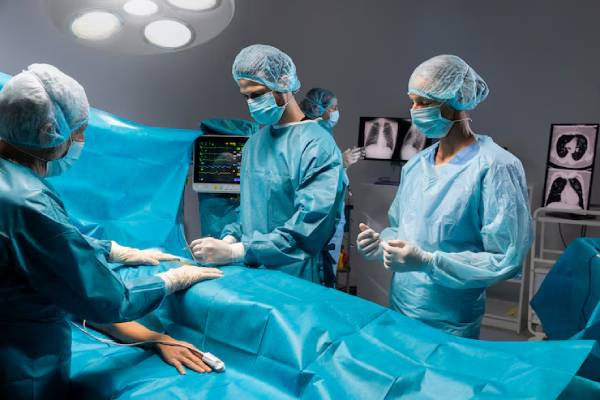Most people think breast cancer surgeons only perform operations. They picture someone who cuts, removes tissue, and moves on to the next patient. This view misses the bigger picture entirely. The reality stretches far beyond what happens in the operating theatre and leads to extending the much needed emotional support.
Breast cancer surgeons London and across the UK dedicate extensive time to patient care that extends well beyond surgery itself. These specialists spend countless hours before and after operations, providing comprehensive support that often goes unnoticed. Their role encompasses monitoring, coordination, and ongoing care that spans years, not just the immediate surgical period.
The Hidden World of Pre-Surgery Planning
Modern cancer care practices reveal something fascinating about surgical preparation. Surgeons don’t just show up on operation day hoping for the best. They spend weeks preparing for each case, reviewing every detail meticulously. This extensive planning phase determines much of the eventual success.
Every patient file gets reviewed multiple times throughout the planning process. Scans are analysed from different angles, with surgeons examining each image carefully. The surgeon considers various surgical approaches, weighing the pros and cons of each option. They develop backup plans for potential complications that might arise during surgery.
Treatment planning meetings happen regularly within cancer care teams. The surgeon sits with oncologists, radiologists, and pathologists to discuss each case thoroughly. These conversations shape the entire treatment strategy, not just the surgical component. Everyone’s input contributes to the final treatment plan.
Sometimes the surgeon recommends delaying surgery for strategic reasons. Perhaps chemotherapy should come first to shrink the tumour effectively. Maybe additional imaging is needed to better understand the cancer’s spread. These decisions require careful consideration of timing and patient outcomes.
Long-Term Monitoring That Spans Years
Post-surgery care extends far beyond the initial recovery period for patients. Surgeons track patients for years, watching for signs of recurrence carefully. They monitor complications that might develop over time. This ongoing relationship often lasts throughout the patient’s lifetime.
Regular follow-up appointments become routine parts of patient care. The surgeon examines the surgical site during each visit thoroughly. They check for changes in surrounding tissue and monitor overall healing progress. These appointments provide reassurance and early detection of potential issues.
Lab results get reviewed monthly, then quarterly, then annually as appropriate. Tumour markers, blood counts, and other indicators help paint a clear picture. The surgeon interprets these results within the context of each patient’s history. Any concerning changes trigger immediate action and further investigation.
Imaging studies continue at prescribed intervals throughout the follow-up period. Mammograms, CT scans, and MRI results all cross the surgeon’s desk. They review each scan carefully for signs of recurrence. This systematic approach ensures nothing gets missed during long-term care.
Coordinating Complex Treatment Teams
Cancer treatment involves multiple specialists working together towards common goals. The surgeon often becomes the central coordinator within this complex system. They ensure everyone stays aligned on the treatment plan throughout care. This coordination role requires exceptional communication and organisational skills.
Communication flows constantly between team members throughout the treatment process. The surgeon updates oncologists about surgical findings and recovery progress. They discuss radiation planning with radiotherapy teams in detail. Coordination with plastic surgeons for reconstruction procedures requires precise timing.
Treatment schedules require careful timing to maximise effectiveness and safety. Chemotherapy cycles must align with healing timelines after surgery. Radiation therapy starts when surgical sites have recovered sufficiently for treatment. Each step depends on the previous one working correctly.
Patient questions get fielded daily by the surgical team. When someone calls with concerns about their treatment, the surgeon responds. They often serve as the first point of contact for issues. Even problems outside their direct specialty come through their office.
Managing Complications Before They Become Problems
Surgical complications can develop weeks or months after the initial procedure. Experienced surgeons spot early warning signs that others might miss completely. This proactive approach prevents minor issues from becoming major problems. Early intervention often makes the difference between quick resolution and lengthy treatment.
Wound healing problems sometimes surface gradually over time after surgery. What starts as minor swelling might indicate infection brewing beneath the surface. The surgeon’s trained eye catches these subtle changes during routine check-ups. Swift action prevents complications from progressing to serious stages.
Lymphoedema represents a common long-term concern for many patients. Arm swelling can begin months after lymph node removal procedures. Early intervention prevents this condition from becoming permanently disabling for patients. Specialist referrals and treatment plans get arranged before symptoms worsen.
Phantom pain and nerve sensitivity require ongoing management and attention. The surgeon works with pain specialists to develop comprehensive treatment plans. These collaborations restore comfort and function for affected patients. Pain management becomes a crucial part of long-term recovery.
Emotional Support Beyond Medical Care
Cancer diagnosis creates overwhelming fear and uncertainty for patients and families. Surgeons find themselves providing emotional support alongside medical treatment regularly. They often become trusted confidants during the most frightening period. These relationships extend far beyond the clinical aspects of care.
Difficult conversations happen regularly within the surgical consultation process. Explaining complex treatment options requires patience and clear communication skills. Discussing prognosis and addressing fears about mortality takes exceptional empathy. These discussions shape how patients approach their entire treatment journey.
Family dynamics come into play during treatment planning and recovery. Spouses, children, and parents all react differently to cancer diagnoses. The surgeon often helps navigate these relationships during planning discussions. Family meetings become part of comprehensive patient care.
Recovery milestones get celebrated together between surgeon and patient. When pathology reports show clear margins, joy is shared genuinely. When reconstruction results exceed expectations, satisfaction is mutual. These moments create lasting bonds that extend beyond medical relationships.
Research and Continuous Learning
Medical knowledge evolves rapidly in cancer treatment and surgical techniques. Surgeons spend significant time staying current with new developments. They study treatment protocols and research findings regularly outside clinic hours. This commitment to learning directly benefits patient care and outcomes.
Clinical trials offer hope for patients with challenging cases. Surgeons evaluate whether their patients might benefit from experimental treatments. They assess innovative surgical approaches that might improve outcomes. These opportunities require extensive research and careful patient selection.
Conference attendance and continuing education consume evenings and weekends regularly. The latest surgical techniques require study and practice to master. New reconstruction options demand hands-on training and certification. Emerging treatment protocols need thorough understanding before implementation.
Peer collaboration extends globally through professional networks and conferences. Surgeons consult with colleagues worldwide on complex cases regularly. They share knowledge and seek input on challenging situations. This collaboration improves outcomes for patients everywhere.
Quality Assurance and Outcome Tracking
Patient outcomes get tracked meticulously by surgical teams and hospital systems. Surgeons review their own results regularly to identify improvement areas. They adjust their techniques based on real-world data and patient feedback. This systematic approach ensures continuous improvement in patient care.
Multidisciplinary team meetings include regular case reviews and outcome discussions. Complications get discussed openly within these professional settings. The goal is learning from each situation rather than assigning blame. These conversations lead to improved protocols and better patient safety.
Hospital quality committees rely heavily on surgeon input and expertise. These specialists help develop new protocols based on clinical experience. They review adverse events to identify system improvements needed. Their contributions to policy changes improve patient safety across departments.
Patient satisfaction surveys provide valuable feedback about care quality. Surgeons use this information to refine their communication approaches. They adjust patient care methods based on feedback received. This responsiveness improves the overall patient experience significantly.
Breast cancer surgery extends far beyond the operating theatre in scope. The surgeon’s role encompasses comprehensive patient care that begins with diagnosis. This involvement continues for years after treatment completion with ongoing monitoring. The extensive commitment reflects the complexity of modern cancer care.
This comprehensive approach benefits patients throughout their entire journey. Having a dedicated specialist who understands every aspect of care provides continuity. They coordinate between different treatment phases and manage long-term concerns. This level of involvement improves both outcomes and patient satisfaction.
If you’re facing breast cancer treatment, consider the value of comprehensive care. Your surgeon’s extensive involvement can support your recovery and long-term health effectively. Schedule a consultation to discuss how this level of care benefits you. Take the first step towards comprehensive treatment by contacting a specialist today.
Featured Image Source: https://img.freepik.com/free-photo/surgical-procedure-made-by-doctor-special-equipment_23-2148962517.jpg







